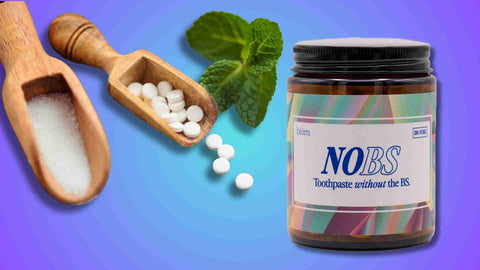Does Xylitol Cause Tooth Decay?
No, xylitol does not cause tooth decay; it is actually beneficial for dental health.
Compared to regular sugar, which fuels cavity-causing bacteria, xylitol does not contribute to tooth decay. Instead, it works to improve oral health in several ways.
Xylitol inhibits the growth of Streptococcus mutans, the primary bacteria responsible for cavity formation, and it promotes increased saliva production. This increased saliva helps neutralize acids, wash away food particles, and supports tooth enamel remineralization.
Additionally, scientific research consistently shows that xylitol can reduce the risk of cavities. Commonly found in dental products like toothpaste and chewing gum, xylitol is used precisely because it helps protect teeth rather than harm them.
Therefore, instead of causing tooth decay, xylitol helps protect teeth and maintain oral health.
Keep reading to learn everything you need to know how xylitol helps prevent tooth decay and supports a healthier smile.
What is xylitol?

Xylitol is a unique, naturally occurring sugar alcohol commonly used as a sweetener in foods and oral care products.
It is derived from sources such as birch bark, corn cobs, and certain fruits and vegetables. Approved by the US Food and Drug Administration (FDA) as an artificial sweetener, it is also recognized for benefits in weight management and health improvement.
Xylitol toothpaste tablets have gained popularity in dental care due to their ability to combat tooth decay and promote oral health. Unlike regular sugar, xylitol does not ferment with oral bacteria, reducing acid production that erodes enamel and leads to cavities.
Sugar-free chewing gum with xylitol is especially effective in reducing dental plaque and promoting oral hygiene, as xylitol cannot be easily digested by bacteria in the mouth.
Moreover, xylitol stimulates saliva production, which helps neutralize acids and remineralize teeth, supporting overall dental hygiene.
Its sweet taste and beneficial effects on oral health make it a common ingredient in chewing gums, toothpaste, mouthwashes, and other dental products.
How does xylitol in toothpaste work?
Xylitol is a unique ingredient in toothpaste that offers several benefits for oral health.
Studies suggest that the primary way xylitol works in toothpaste is by inhibiting the growth of cavity-causing bacteria, thanks to its anti-cariogenic properties.
Unlike regular sugar, xylitol cannot be metabolized by harmful bacteria in the mouth, such as Streptococcus mutans. These bacteria feed on fermentable carbohydrates and produce acids that erode tooth enamel, leading to cavities.
However, when xylitol is present, the bacteria are unable to use it as an energy source, effectively starving them and preventing them from multiplying and producing decay-causing acids.
In addition to its antibacterial properties, xylitol has also been shown to stimulate saliva production. Increased saliva flow helps neutralize acids, wash away food debris, and facilitate the remineralization of tooth enamel. This natural process of remineralization strengthens the teeth and makes them more resistant to decay.
Furthermore, the sweet taste of xylitol makes toothpaste more palatable, which can encourage better compliance with oral hygiene routines, especially in children.
This, in turn, can lead to improved plaque removal and overall oral health.
Additionally, xylitol mouth rinse is used in treating oral yeast infections and has a synergistic action with chlorhexidine to inhibit streptococci during biofilm development.
So, is xylitol causing tooth decay?

Research suggests that xylitol, a sugar alcohol commonly used as a sweetener, does not cause tooth decay and is, in fact, effective in preventing cavities.
Compared to regular sugar, xylitol cannot be metabolized by the harmful bacteria Streptococcus mutans, which are primarily responsible for causing cavities. These bacteria feed on fermentable carbohydrates and produce acids that erode tooth enamel, leading to cavities.
However, when xylitol is present, the bacteria are unable to use it as an energy source, effectively starving them and preventing them from multiplying and producing decay-causing acids. Studies have shown that xylitol can inhibit the growth of Streptococcus mutans and reduce the risk of tooth decay.
Xylitol also stimulates saliva production, helping neutralize acids, clear away food particles, and support tooth enamel remineralization, making teeth more resistant to decay.
Furthermore, the sweet taste of xylitol makes it a popular ingredient in various oral care products, such as toothpaste, chewing gum, and mints, which can encourage better compliance with oral hygiene routines, especially in children, leading to improved plaque removal and overall oral health.
In contrast, research has consistently shown that regular sugar consumption is a major contributor to tooth decay. Sugar provides an ideal food source for cavity-causing bacteria, leading to the production of acids that erode tooth enamel.
Frequent snacking on sugary foods and drinks can create an environment in the mouth that is conducive to bacterial growth and tooth decay.
All in all, the research overwhelmingly suggests that xylitol is good for your teeth as it does not cause tooth decay and is, in fact, an effective tool for preventing cavities. Its unique properties, including its inability to be metabolized by harmful bacteria and its ability to stimulate saliva production, make it a valuable ingredient for maintaining good oral health.
While regular sugar consumption is a major risk factor for tooth decay, xylitol offers a safe and effective alternative sweetener that can help protect the teeth from the damaging effects of cavities.
Can xylitol help prevent cavities?
Yes, xylitol can help prevent cavities by inhibiting cavity-causing bacteria.
Using sugar free chewing gum containing xylitol is particularly effective in preventing tooth decay as it cannot be easily digested by bacteria in the mouth, thus lowering dental plaque levels and maintaining oral hygiene. When you use products containing xylitol, such as toothpaste or gum, you’re actively fighting against the primary culprits of tooth decay: harmful bacteria in your mouth.
Chewing xylitol gum effectively reduces salivary and plaque S. mutans levels, decreasing caries incidence, and promoting remineralization of tooth enamel.
Xylitol works by inhibiting the growth of Streptococcus mutans, the bacteria that play a significant role in tooth decay. Unlike regular sugar, which these bacteria metabolize into acid that erodes tooth enamel, xylitol doesn’t provide a food source for them.
This reduction in acid production helps protect your enamel from decay.
Additionally, xylitol enhances saliva production, which is crucial for neutralizing acids, washing away food particles, and delivering minerals that help repair and strengthen our enamel.
Does xylitol reverse cavities?

No, xylitol toothpaste does not reverse cavities. This is because you cannot remineralize a cavity once it has already formed.
That said, xylitol toothpaste can help in the early stages of cavity formation by promoting remineralization, a process where minerals are redeposited in demineralized tooth enamel. Xylitol increases saliva production, which is rich in minerals like calcium and phosphate that can strengthen tooth enamel and potentially reverse early enamel erosion.
This process can prevent smaller cavities from progressing past the initial stages of tooth decay. However, xylitol toothpaste cannot reverse cavities that have progressed beyond the initial stage of enamel demineralization to form a physical cavity.
Once a cavity has fully formed, you'll have to see a dentist for professional treatment to remove the decay and restore the tooth.
So, while xylitol toothpaste is great for supporting your overall oral health and reversing the early stages of tooth decay, it's not a substitute for professional treatment of established cavities.
Can xylitol remineralize your teeth?
Yes, xylitol does remineralize teeth. In addition to preliminary evidence that xylitol remineralizes teeth on its own, xylitol also indirectly enhances the remineralization process by creating an alkaline environment in the mouth that is conducive to remineralization.
It does so by reducing the levels of decay-causing bacteria and not providing the fermentable sugar those bacteria need to produce harmful acids. This reduction in acid supports healthy pH balance which we need for minerals like calcium and phosphate to be deposited into tooth enamel.

Further, xylitol in toothpaste stimulates saliva production, which is a natural defense mechanism against tooth decay. Saliva not only helps to wash away food particles and bacteria but also brings more remineralizing minerals in contact with the enamel.
This process supports the repair of early enamel lesions and prevents the progression of tooth decay. That said, xylitol cannot reverse cavities.
Finally, studies also show that xylitol can enhance the remineralization effect of remineralizing toothpaste, such as fluoride toothpaste.
Is it safe to have xylitol toothpaste every day?

Yes, it is generally safe to use xylitol toothpaste every day. In fact, its safety and efficacy in dental care are well-documented.
You see, xylitol works differently from sugar; while sugar fuels the growth of harmful bacteria in our mouths, xylitol does the opposite. It actually can't be metabolized by these bacteria which leads to a reduction in their growth and activity.
This mechanism helps in lowering the risk of dental cavities and improving overall oral health. Further, xylitol's ability to neutralize acidity and maintain a neutral pH in the mouth supports the prevention of dental decay and cavities. That said, xylitol cannot reverse cavities.
Since xylitol can be beneficial for our oral health, you should include it in your overall daily oral care routine, including brushing with xylitol toothpaste, flossing with expandable floss, and tongue scraping.
Can xylitol be used to whiten teeth?
No, xylitol itself does not whiten teeth in the way that bleaching agents or abrasive substances do. Instead, xylitol's strength lies in its ability to improve oral health, which can indirectly contribute to a brighter smile.
As a natural sugar alcohol found in many fruits and vegetables, xylitol is unique because it can't be metabolized by the harmful bacteria in your mouth that cause cavities and dental plaque. When you use products containing xylitol, such as toothpaste, mouthwash, or chewing gum, you're able to reduce the levels of these bacteria.
Less plaque and fewer bacteria mean your teeth can stay cleaner and appear whiter, as there's less buildup to cause staining and discoloration.
Also, xylitol stimulates saliva production, which is beneficial for oral health in several ways. Increased saliva flow helps get rid of food particles and neutralize acids which protects your enamel from erosion and the potential development of dental caries.
This protective effect can keep your teeth stronger and healthier, which naturally supports a whiter appearance.
Therefore, while xylitol doesn't bleach your teeth, incorporating it into your oral hygiene routine can create conditions that promote oral health and, as a result, a brighter smile.
Make sure to use it alongside teeth whitening products like whitening strips if you have particularly stubborn tooth stains.
The Benefits of Xylitol for Your Oral Health

Xylitol offers many benefits for our oral health, making it a standout ingredient in toothpaste, chewing gums, and other dental care products.
It is also used in various oral health products such as mouth rinses and dental aids, where it helps prevent tooth decay, reduce soft tissue irritation and bleeding, lower acid levels on teeth, and re-mineralize dental enamel.
Let’s walk through 5 of the most important benefits together.
Prevents Cavities
One of the most celebrated benefits of xylitol is its ability to prevent cavities.
Xylitol works by inhibiting the growth of Streptococcus mutans, a cariogenic bacteria primarily responsible for tooth decay. Unlike regular sugars that feed harmful oral bacteria, xylitol can't be metabolized by these bacteria, thereby reducing their growth and the acids they produce that wear away at enamel.
Research suggests that regularly using xylitol toothpaste can significantly lower your risk of developing dental cavities, offering a proactive approach to oral health.
Reduces Plaque
Plaque buildup is a major contributing factor to dental health issues, including cavities and gum disease. Thankfully, xylitol is known for its ability to reduce the amount of plaque-forming bacteria in our mouths.
Since xylitol doesn't serve as a food source for these bacteria, their ability to stick to teeth and form plaque is diminished. This process helps keep your teeth cleaner and healthier, reducing the likelihood of oral health problems down the line.
Enhances Saliva Production
Saliva is a natural defense mechanism against tooth decay, and xylitol helps enhance its production. By stimulating saliva flow, xylitol helps neutralize acids in the mouth, washing away food particles, and keeping the mouth moist.
This increased saliva production is particularly beneficial for those of us suffering from dry mouth, a condition that can increase the risk of tooth decay and gum disease.
Remineralizes Teeth
Remineralization is one of xylitol’s most important benefits. Your saliva, stimulated by xylitol is rich in important minerals like calcium and phosphate which your body uses to remineralize, repair, and strengthen your enamel.
This process not only reverses tooth decay but also fortifies your teeth against future erosion.
Tastes Great
Beyond its health benefits, xylitol is naturally sweet, and adding it to toothpaste makes it more enjoyable to brush with, especially for children and those who are sensitive to the taste of traditional toothpaste.
This pleasant taste encourages regular brushing and contributes to better oral hygiene without the negative effects of sugar.
Side Effects of Xylitol Toothpaste

While xylitol toothpaste is widely regarded for its oral health benefits, there are a few potential side effects to be aware of. Let's walk through some of the potential consequences of xylitol, largely related to gastrointestinal effects and its impact on individuals with certain sensitivities.
Gastrointestinal Discomfort
Xylitol can cause gastrointestinal discomfort for some people, especially when swallowed in large quantities.
This is because xylitol is a sugar alcohol, which can be difficult for the body to digest if consumed in significant quantities. Symptoms may include bloating, gas, and diarrhea.
However, the amount of xylitol present in toothpaste is typically small, and since you don't ingest toothpaste, this side effect is more commonly associated with xylitol in food products rather than in dental care products.
Allergic Reactions
Although rare, some individuals may experience allergic reactions to xylitol. Symptoms could include itching, swelling, or irritation in the mouth or throat.
Anyone known to have allergies to sugar alcohols or specific sensitivities should proceed with caution and consul their dentist if they suspect an allergic reaction to xylitol toothpaste.
Toxicity in Pets
It's important to note that while xylitol is safe for human use, it is highly toxic to dogs and certain other pets. Even small amounts can cause hypoglycemia (low blood sugar), seizures, liver failure, or even death in dogs. Therefore, you should keep products containing xylitol, including toothpaste, out of reach of pets.
Is xylitol safe for kids?

Yes, xylitol toothpaste for kids is safe and can be a beneficial addition to their oral hygiene routine.
Xylitol is a natural sweetener that not only makes the toothpaste more palatable for children but also offers oral health benefits. For example, unlike sugar, xylitol doesn’t contribute to tooth decay.
Instead, xylitol helps reduce the levels of decay-causing bacteria in our mouths and can decrease your child’s risk of cavities. Further, xylitol’s ability to stimulate saliva production is also beneficial in protecting against dry mouth and aiding in the natural process of remineralization of our teeth.
Be sure to supervise children as they learn to brush safely, ensuring they brush twice daily for two minutes.
Frequently Asked Questions
Is xylitol causing tooth decay?
No, xylitol does not cause tooth decay. In fact, xylitol helps prevent cavities by inhibiting the growth of cavity-causing bacteria and increasing saliva production, which helps protect tooth enamel. Research supports that xylitol is beneficial for dental health rather than harmful.
What are the negative effects of xylitol?
No, xylitol does not cause tooth decay. In fact, it helps prevent cavities by inhibiting the growth of harmful bacteria and increasing saliva production, which strengthens tooth enamel. However, consuming xylitol in large amounts can lead to digestive issues such as bloating, gas, or diarrhea, especially for those not used to it. It’s also important to keep xylitol out of reach of pets, as it can be toxic to dogs.
Is xylitol recommended by dentists?
Yes, many dentists, including those practicing pediatric dentistry, recommend xylitol as part of a comprehensive oral care routine. Studies suggest that xylitol can help reduce the risk of cavities by inhibiting harmful bacteria and promoting saliva production, which aids in remineralization. Dentists often advise using xylitol-containing products, such as chewing gum or toothpaste, to enhance dental health and prevent tooth decay.
Is it okay to have xylitol every day?
Yes, it is generally okay to have xylitol every day, as long as you use it in moderation. Daily consumption of xylitol can be beneficial for dental health, helping to reduce cavity-causing bacteria and promote saliva production. However, excessive intake can lead to digestive issues such as bloating and diarrhea, so it’s best to start with small amounts and adjust as needed. Additionally, always keep xylitol products away from pets, as xylitol can be toxic to dogs
Can xylitol remove tartar?
Xylitol does not directly remove tartar, but it can help maintain oral health and prevent tartar buildup. Xylitol works by reducing cavity-causing bacteria and increasing saliva production, which helps wash away food particles and acids that contribute to tartar formation. While xylitol can support overall dental health, regular brushing, flossing, and professional cleanings are necessary to effectively remove existing tartar and prevent new buildup.






















